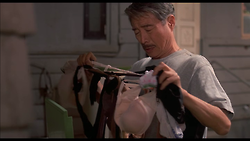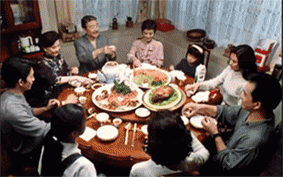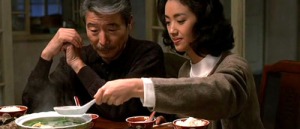I just want to start by saying that this movie had one of the biggest and most surprising plot twists I've ever seen in my life (Like whoa, did anyone even see that coming?!) and also, good God, the food in this show. Honestly, I'm surprised that didn't completely distract all of us from the plot. It just looked so good (there will be pictures, we can all suffer together :B).
Parts of the movie really resonated with me... and the visuals (oh God, the visuals). The amount of symbolism in this film is insane. Almost every detail and scene in this movie is significant (at least the ones I remember), no matter how small, and I absolutely adore that.
Let's talk about the opening scene, traffic. This scene plays back in different variations at least 3? times in the movie. The first two times, it is almost the same.The final times, it included a traffic conductor. While I do think this highlighted the normalcy or everyday life and also how life goes on (especially after Wen's death), I also think it showed us how things change over time, one of the main themes of the movie. The clashing of the old and new till they finally reach equilibrium. We see this clash within the first 10 minutes, where Chu prepares a very traditional (and elaborate) feast. The contrast between him and his daughters is then amplified, very subtly, through cuts to their lives amidst his cooking. JiaJen, the only Christian in the family taking the bus (Chu walks/jogs everywhere), JiaChien, doing research in a modern office, and JiaNing, working at a fastfood chain (contrast with Chu's traditional cooking).
From their disdain at having to attend the Sunday torture rituals and the future where one of them has to take care of Chu, we understand their views towards their father and filial piety; It is an obligation, a task, an undesirable chore. At the start, it is decidedly clear, this is not a happy family and they all seem a little lost. Communication in this family is really quite terrible, not just between Chu and his daughters but also among the siblings (that's why each announcement is a huge shock to the whole family. also, the plate scene).
As things progress, people start leaving the house one by one. Ironically, this all starts with JiaChien announcing her decision to leave. However, she ends up being the one who prepares the feast after everyone, including her father has left the house to start a new life. Although she starts out as being the most modern (business world, casual sex), we slowly catch glimpses that show she may be more grounded in tradition. One in particular was the way she poured the tea in her meeting with LiKai (fourth picture in the left collumn below). She lets the tea overflow first and then pours it into a large cup before the other cups (I don't know if this is what Ang Lee was hinting at when he shot the close ups of her hands and the tea set, but it would be cool if it was). I felt that this meant she found equilibrium between the modern and the old, and she was happy.
Cooking and food were obviously huge parts of the film and characters. It served as a form of expression of love, communication as well as where announcements (pretty hilariously enough) are made. Like Wen said "You are as repressed as a turtle", Chu bottles his feelings up as he finds it hard to communicate with his daughters, something I can definitely identify with. After so long being distant (we know he wasn't like this earlier, from JiaChien's story of her bread ring), it's hard to break the habit and show them what he really feels, much less tell them. So, he does what he's good at, he cooks for them. I feel like most Asian families are this way, we rarely verbally express our love to family. Instead, we try our best to show it... and sometimes, we even try to hide that (just like the final time we see Chu waking up Jia Chien. at first he rubs her shoulders lovingly, then he seemingly realises how this isn't normal and roughly shouts her name, to which she does wake up). Still, food has always been a sort of "safe" way to express care and etc., whether it is preparing it, or eating it. I am reminded of something I read the other day.
Outside the film, food is a huge thing in Chinese culture ( okay, maybe Eastern culture in general). I'm what is considered a "banana" or "xiang jiao ren", I can't speak much of the language. My extended family on the other hand is predominantly Chinese-based and speak only Cantonese or Mandarin (which is funny because we're all Hokkien). Family gatherings usually include the older generation talking among themselves while me and my two other banana cousins nod at everything (i'm exaggerating). The one thing we all seem to bond over is, food, and I mean consuming it (with much gusto). Although, this is a slightly different reason than in the film, it is the way we show love, acceptance and care to each other, the older generation in preparing it (and feeding us to the brink of explosion), the younger one in finishing it. Back to the movie, this is one of the reasons why I may have felt some sort of emotional pain when I saw how Chu's meticulously and lovingly prepared feastS (yes, plural) were criticised and most of the time barely even touched by his daughters.
However, that made their character development more significant towards the end of the movie. Throughout the movie, we watch feasts being prepared, but we almost never see any of them eating it. Maybe a few bites here and there but there's always a lot left over. In the final gathering, you see scenes of chopsticks mingling, sharing the food and they're really digging in. It symbolises the change in their attitudes and how food is viewed.. ish. Initially, it's just a way to fill the stomach. You can tell Chu sees this and tries to restore it back to its full glory, all the effort he puts in.. but even he doesn't really eat it. It's like the cook in the restaurant throwing all the leftover food into the bin and how Chu talks about what is passable as food. Food has become corrupted somewhat. At the gathering though, it's like it has been restored to it's original form, and we finally see everyone eating with joy.
The atmosphere is light (up to his announcement) and everyone has a new start... except for JiaChien, who's declined her promotion in Amsterdam to stay and help her father (finally, out of love and not obligation). At first, when he announced he was selling the house, I was honestly a bit mad, because how could he have suddenly done this to his daughter (he did promise to let her stay there after her apartment tanked). But, I've realised he did it for her. They all thought he was fragile, with nothing left to live for and, like JiaChien said "he needs me". But by making that announcement, he's sort of saying "don't worry about me, live your life." So she gets to do what she initially wanted, to start anew, in Amsterdam (which we understand from the phone call from GuoLun).
I also think the idea of a chef losing his sense of taste is genius. It's so ironic and carries such a deep meaning. From the film, I am inclined to believe that taste is an analogy of feeling, meaning and family. As a chef, one of the things most important to you is probably your sense of taste. As a father, it would be your family. As a person, it might be your meaning in life. He was losing touch with all three, so, he was just lost in the beginning, directionless. He felt everything drifting away, but didn't know how to stop it. So he keeps going on with the routine, preparing the elaborate meals that have lost part of their meaning for his semi-present family. This is why I just love the ending. I love how Ang Lee wasn't all in your face about it. No one made it to the reunion dinner, it was just him and JiaChien, the one whose bond with him is the strongest. It starts of fairly simple, he takes a sip of her soup and complains "too much ginger". They bicker about it for a while before he suddenly realises, he can taste again. They've finally come to an understanding and everything is going well. It echoes the first interaction we see with them (where JiaChien critiques his food) so closely that we're reminded of how prickly it was then. Then we compare it with this one, and the contrast is just so huge and .. I just really love this movie. The dishes in this final scene are also so much more modest and simple, it's like saying, it's the feeling that counts. (*melts into oblivion*)
word count:1599
PS: It's amazing how Ang Lee still kept it so humourous and yet so real. The way the romances escalated were really something though, like something from a disney movie. And also I remember this scene cause I thought it was out of place but, there was actually a foreshadowing of JiaNing's pregnancy (I think). Or not how else can we interpret the random scene where she gets up and let's a pregnant lady take her seat on the bus?










.JPG)

0 comments:
Post a Comment